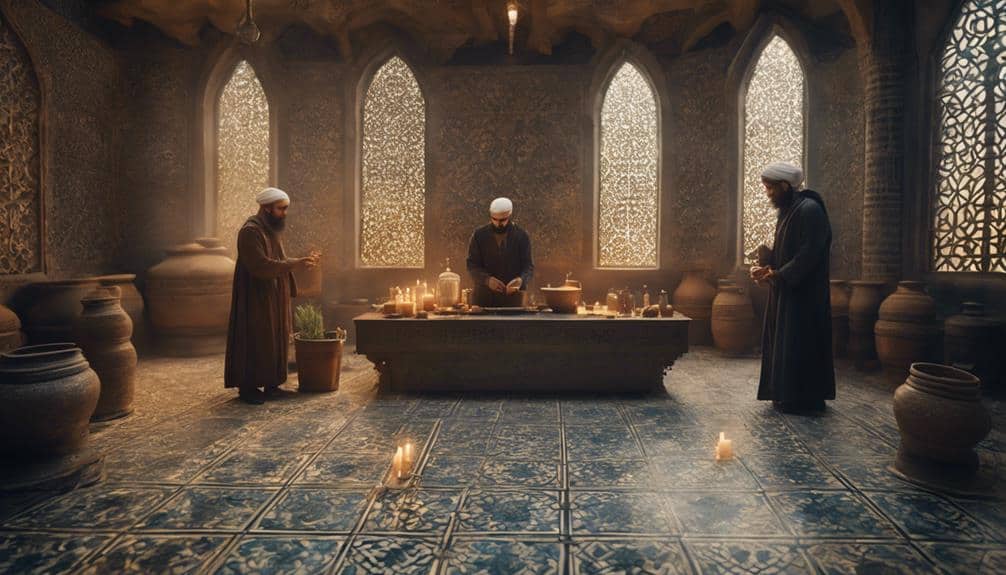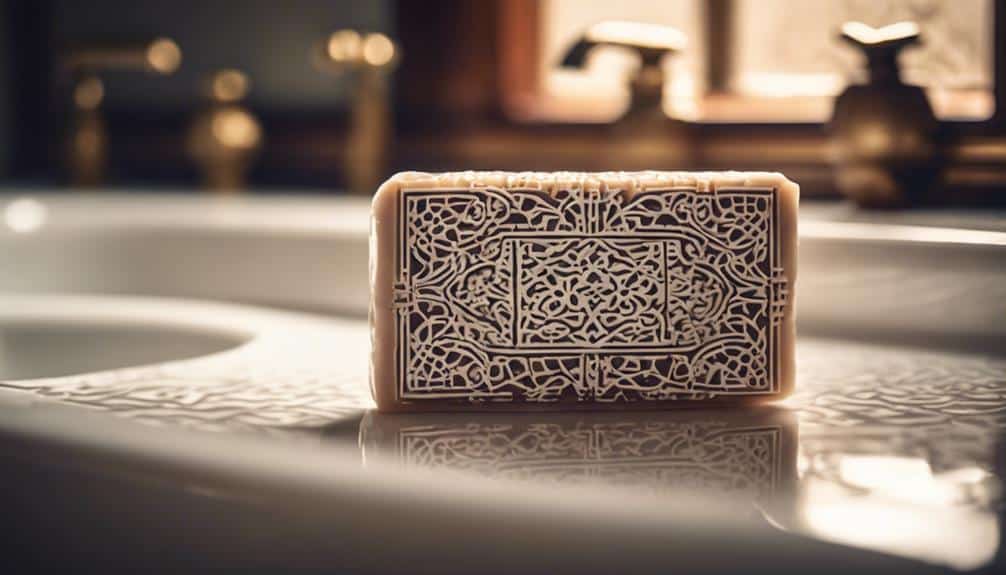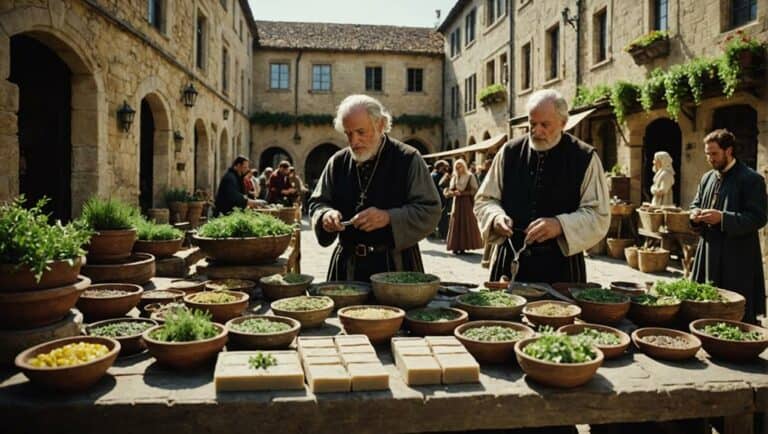During the Islamic Golden Age, scholars like Al-Razi revolutionized soap-making, introducing advanced recipes that elevated hygiene standards.
Discover how these innovations not only transformed public health in their time but continue to influence modern soap production and everyday cleanliness.
Origins of Soap-Making
The origins of soap-making can be traced back to the Islamic Golden Age when Muslim scientists like Muhammad ibn Zakariya al-Razi developed refined recipes and techniques. During this period, soap-making evolved from rudimentary methods used in ancient Babylon and Egypt to more sophisticated processes. Al-Razi's contributions were crucial; he discovered the recipe for hard toilet soap, which not only had a pleasant smell but also established soap-making as a growing industry in the Middle East.
The process of soap-making during the Islamic Golden Age involved mixing oil with a lye solution derived from ashes. This technique was greatly improved, leading to the production of high-quality soaps that were essential for maintaining hygiene and cleanliness. The advancements in soap production during this era underscored the importance of cleanliness in daily life and public health.
As you explore the history of soap-making, it's evident that the innovations of the Islamic Golden Age laid a strong foundation. The meticulous work of al-Razi and his contemporaries exemplifies how scientific inquiry and practical applications can transform everyday practices, making soap an indispensable tool for hygiene and cleanliness.
Innovations by Islamic Scholars

Building on the foundational work of early soap-making, Islamic scholars introduced groundbreaking innovations that transformed hygiene and public health practices during the Islamic Golden Age. The contributions of Muhammad ibn Zakariya al-Razi were particularly notable. By refining soap recipes, he and other scholars created hard toilet soap with a pleasant aroma, enhancing both cleanliness and user experience.
Islamic scholars didn't stop at improving soap formulas. They also utilized alcohol, not just for medicinal purposes, but as a component in the soap-making process. This integration highlighted their advanced understanding of chemistry and its practical applications in daily life.
Moreover, the establishment of quarantine methods during the Umayyad Caliphate showcased the innovative approaches to hygiene and healthcare by Islamic scholars. These methods were essential in controlling the spread of diseases, demonstrating a sophisticated grasp of public health principles.
The Islamic Golden Age was marked by significant medicinal advancements, with figures like Jabir ibn Hayyan contributing to the broader field of hygiene. Their work laid the groundwork for modern practices, illustrating the profound impact of Islamic scholars on the evolution of cleanliness and health.
Through these innovations, they set new standards in hygiene that would influence generations to come.
Impact on European Hygiene

Islamic advancements in soap-making during the Golden Age fundamentally reshaped European hygiene practices, setting new standards for cleanliness and public health. When Islamic soap recipes reached Europe, they introduced more effective methods for maintaining hygiene and sanitation. You can trace much of Europe's subsequent improvements in cleanliness back to the innovations developed in the Middle East.
The Middle East's expertise in soap production during the Golden Age produced soaps that weren't only more effective but also more widely available. As these superior products made their way to Europe, they catalyzed a much-needed revolution in hygiene. The enhanced soap recipes brought over by traders and scholars included better ingredients and techniques, which Europeans quickly adopted.
Adopting these Islamic soap-making methods led to significant changes in European society. Public health improved as communities embraced these superior hygiene standards. The ripple effect of this adoption was profound: better sanitation reduced the spread of diseases and increased general public wellbeing.
In essence, the Islamic contributions to soap production provided Europe with the tools to elevate their hygiene practices, laying the groundwork for modern standards of cleanliness.
Techniques and Ingredients

As you explore the techniques and ingredients of soap making during the Islamic Golden Age, you'll notice a remarkable shift from using animal fats like tallow to incorporating vegetable oils, reflecting the innovation and adaptability of soap makers.
Traditional techniques initially relied on animal fats, which were rich in fatty acids essential for producing effective soap. However, the abundant availability and diverse properties of vegetable oils led soap makers to experiment with these new ingredients.
This experimentation wasn't merely for variety; it allowed for the creation of different types of soap, including liquid soap, marking a significant innovation in soap production. By altering the types of fats used, soap makers could control the texture, efficacy, and even the fragrance of their products. This adaptability showcased their ability to refine traditional techniques and respond to the needs of their communities.
The shift to vegetable oils also had economic and ecological implications, as these oils were often more sustainable and accessible than animal fats. Thus, the Islamic Golden Age's soap production became a beacon of innovation, with soap makers continually refining their methods and ingredients to produce superior cleansing products.
Legacy in Modern Times

The innovations and adaptability seen in soap making during the Islamic Golden Age have left a lasting legacy in modern times, shaping today's industrial soap production and hygiene practices. You can trace the roots of contemporary soap-making recipes back to the methods developed in Islamic lands, where the introduction of vegetable oils and aromatic ingredients set new standards. These advancements not only improved soap's quality but also highlighted its health benefits, influencing the global soap industry.
The Islamic Golden Age's influence extends beyond soap to modern medicine and public health. Early Muslim scientists pioneered the use of alcohol in sanitizers, a practice that's become crucial in today's hygiene routines. Additionally, the establishment of quarantine methods during the Umayyad Caliphate laid the groundwork for current quarantine and infection control protocols.
Industrialization of soap production has its foundations in these ancient techniques, ensuring mass availability and maintaining public health. Islamic contributions to hygiene and medicine have had a profound global impact, embedding principles of cleanliness into modern practices. By understanding this historical context, you can better appreciate the enduring significance of these innovations in our daily lives.


